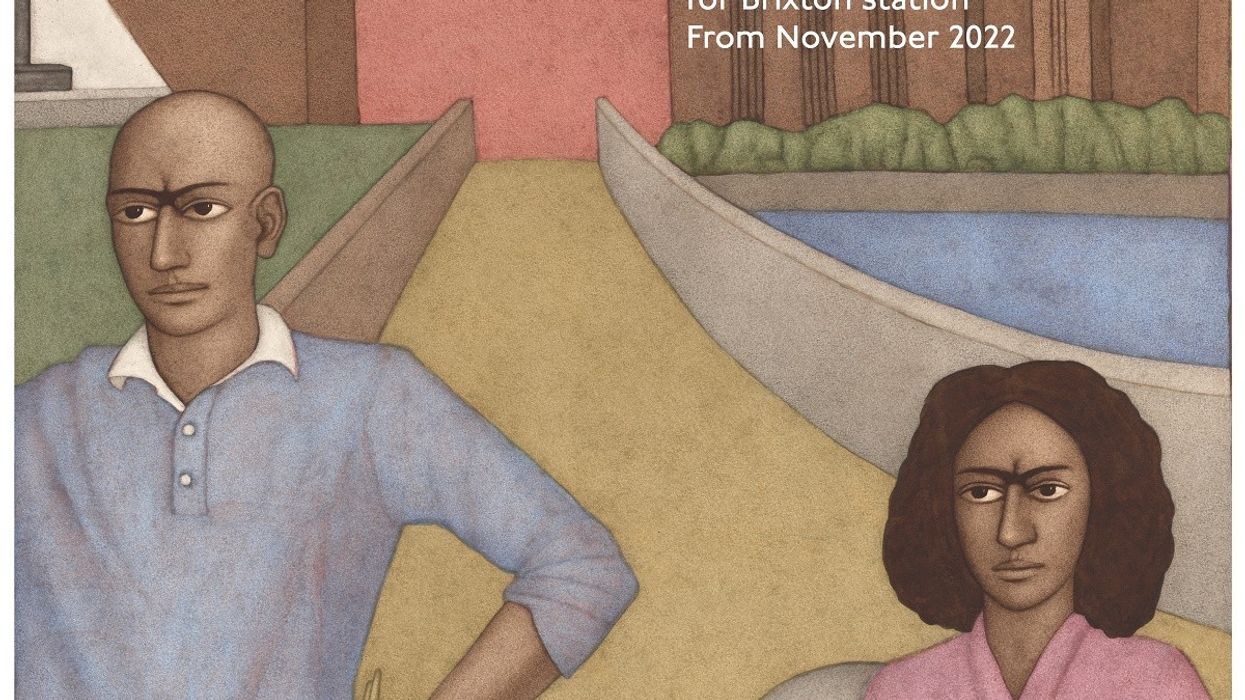Art on the Underground presents ‘Endurance’, a new large-scale public commission at Brixton Underground Station by Indian-born artist Shanti Panchal, launching November 10 and will be on view for a year.
The work at Brixton will be Panchal’s first public artwork since his 1993 tiled mural for the London Borough of Harrow.
‘Endurance’ is the sixth in a series of commissions at Brixton station, following on from Joy Labinjo, Helen Johnson, Denzil Forrester, Aliza Nisenbaum, and Njideka Akunyili Crosby.
The programme invites artists to respond to the diverse narratives of the local murals painted in the 1980s, the rapid development of the area, and the wider social and political history of mural making.
‘Endurance’ is a reproduction of a large-scale water-colour artwork in which Panchal has painted a community portrait that observes our continued resilience and interdependence.
Shown in the image are three scenes of Londoners – the people include an artist, an NHS worker, a waiter, people at work, and at leisure.
In the background are buildings, statues and sections of open public space that draw on the Brixton neighbourhood and wider context of London.
The architecture seen behind the figures includes the Black Cultural Archives, Brixton Windmill and Tate Modern.
Present among the scenes are The African and Caribbean War Memorial and the Cherry Groce Memorial Pavilion in Windrush Square. These draw into the artwork monuments to places and people that we celebrate, that we have lost, that have been taken from us, where we gather and build anew.
Deeply influenced by the country of his birth, India, Panchal’s work is connected to his childhood years in Mesar, North Gujarat - the colours of his village, the embodied spirituality of family life and the intensity of a small farming community. The figures in Panchal’s work carry this interior world with them, their poses and faces reminiscent of early Jain Miniature paintings.
The eyes in Panchal’s figures do not directly look at each other but the artist visually creates the suggestion of a third eye, which talks of a different connection between us of shared memory and spirituality.
Panchal’s artwork for Brixton was produced over six months with layers of water-colour pigment worked into the paper almost like the process of a fresco mural.
The depth of colour this creates draws on the hues of Panchal’s childhood and creates an image as though sealed with a meditative filter. There is an intentional slowness and care to this process of painting.
Panchal holds conversations with the figures he is painting which creates an intimacy between the artist and the scene, drawing together memory, experience and the present in a composition that reflects our contemporary moment.
During the 1970s and 80s, London became an important city for mural production. Murals from this period represent the political climate, social context and communities who collaboratively made them.
Panchal’s 'Endurance' centres this history of mural making in Lambeth and London that were the starting point for Art on the Underground’s programme at Brixton station.
In 1984, The Greater London Council (GLC) launched its Anti-Racist Mural Programme. This programme commissioned four murals, one by Panchal and Dushela Ahmad in Tower Hamlets, which partly still exists at the crossroads of Dellow Street and Lowood Street in Shadwell.
A second by Keith Piper and Chila Kumari Singh Burman in Southall, a third from
Lubaina Himid and Simone Alexander in Meanwhile Gardens, Notting Hill and the fourth in
Brixton from Gavin Jantjes and Tam Joseph.
Panchal has produced several murals since his 1984 work in East London, central to
Panchal’s continued practice is the process of using paint to tell a story of a moment in time,
encapsulating complexities, relationships and scenes from a community, from lives ever
adapting to the present.
“It has been an exciting experience, painting for six months on the Brixton mural, exploring Brixton’s history, art and culture. I wanted to reflect and celebrate the vibrant cultural life in Brixton and London. We have suffered a great deal in the past few years but the resilience and healing powers of people have always found a way to overcome adversities throughout history. People and places in the mural tell us a story of each community within Brixton and London. I feel that we have endured difficult and hard times in the past, facing challenges of the present and looking forward to a bright future," Panchal said.
Justine Simons OBE, deputy mayor, Culture and the Creative Industries, said: “Art on the Underground’s series of murals at Brixton have been a real success, enriching the journeys of those travelling through the station each day. In this new commission, Panchal has created a beautiful mural that reflects the diversity and resilience of Brixton, while celebrating its rich history and culture. I hope this work will inspire a new generation to continue the tradition of art and design on London Underground.”
Eleanor Pinfield, head of Art on the Underground, said: “Shanti Panchal’s artwork for Brixton station reverberates with the history of mural making in London, as we recognise Panchal’s participation in the GLC Anti-Racist Mural Programme of the 1980s. And yet, this new work speaks to the issues of today. Panchal’s triptych painting depicts the challenges and sorrows of the past two years, alongside the monuments of contemporary Brixton, whilst his intimate figures speak to a universal resilience and hope for the future. Endurance is a work that will be enjoyed by millions of people as they contemplate the artwork on their daily journeys.”




